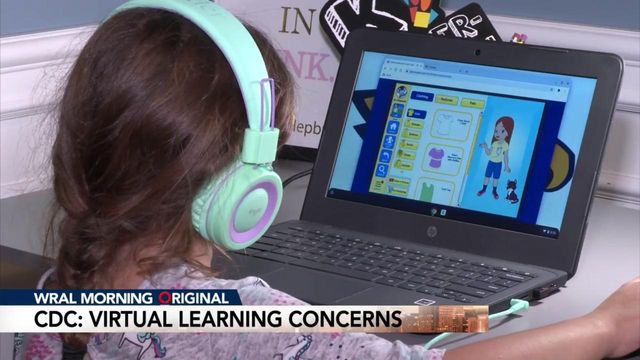CDC survey highlights concerns with virtual learning
Researchers revealed concerns about "virtual learning" on a child's mental and emotional health.
Posted — UpdatedCricket Thornton, the mother of children ages 5, 10 and 12, talked to WRAL News while her children explored a packed Pullen Park in Raleigh. They were making the most of the pleasant days outdoors before a return to real school with in-classroom learning.
"They are about to go back on the 14th for the first time," said Thornton. Her children have participated in the Wake County Public School System’s three-week rotation, attending in-classroom learning four days one week out of every three.
After months of virtual learning during the pandemic, the family transitioned to that hybrid schedule.
Thornton says it was difficult for 10-year-old Chance. "I think he didn’t have the stamina for a full regular school day," explained his mom.
The time away from classmates and teachers was more than just a short-term inconvenience, according to Cleveland Clinic pediatric psychologist Dr. Vanessa Jensen. "When everything sort of stopped at first, we thought, this is going to be brief. We can all handle this. We can do six weeks," remembers Jensen.
Then she said, "Six went to twelve and then four months and then six months, to where it got really discouraging for a lot of kids who feel like, 'Is this what life is going to be?'"
A recent CDC survey looked at more than 1,200 parents with children between ages 5 and 12. Researchers found those involved with full-time virtual learning or even a hybrid model were more likely to struggle with mental, emotional and physical health.
The survey found parents also dealt with emotional distress, job stability issues and child-care worries.
Thornton says it was difficult for her kids. School became "a lot of sitting in front of the laptop, which I was not a big fan of," said Thornton.
Jensen says many parents are having a hard time right now. "My big message tends to be for parents to take care of themselves and not to be too hard on themselves," explained Jensen.
She added, "Parenting is hard by itself, and this has just thrown all of us, no matter what age your kids are."
Even the limited in-class learning the Thorntons experienced, in the county’s transitional hybrid approach, included fewer students in the classroom and very limited socializing.
"Lunch time was miserable because (students) couldn’t talk to anybody. You couldn’t even socialize. It’s not allowed during lunchtime," said Thornton.
Now, with a return to a regular, in-school schedule, Thornton said, "I think they are definitely ready for some normalcy."
Researchers involved in the survey suggested more needs to be done to ensure kids can safely return to their schools. They recommend that children who continue virtual learning may need additional support to help them cope.
• Credits
Copyright 2024 by Capitol Broadcasting Company. All rights reserved. This material may not be published, broadcast, rewritten or redistributed.






